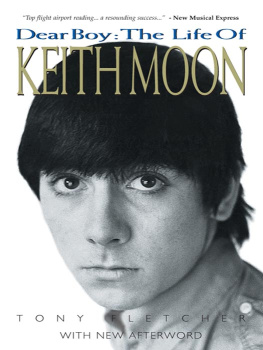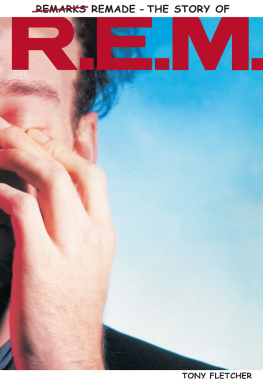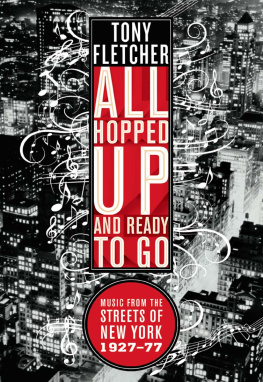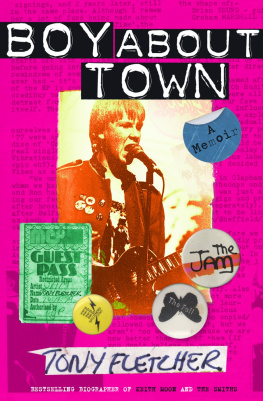
T he original edition of this book, entitled Remarks, was researched and written during the first six months of 1989, at a time when R.E.M. were finally breaking out of cult status and into the public domain of hit singles, platinum albums and sports arenas. At least that was the case in the USA, where Remarks was published in 1990. In the UK, where it came out in the autumn of 1989, R.E.M. had yet to score even a top 50 single. They were critics darlings for sure, and their imprint was indelibly stamped on the Eighties as one of the decades most influential groups, but they were hardly a household name.
To attract R.E.M.s passionate but limited following, Remarks was kept short. It was then artfully laid out by Liz Nicholson with nearly a hundred photographs, many of them rare and/or unseen. The up side to this was a book both visually attractive and materially inexpensive, an accessible and accurate introduction to a group that had long been shrouded in mystery. The down side was that some people looked at its photo-intensive layout and took it to be frivolous and/or lightweight, as if it had been assembled from press cuttings rather than solid research.
Hardly. I had been a dedicated fan of R.E.M. from the moment I first heard Murmur, in 1983. I had witnessed all three of the bands dbut performances in the UK during November 1983. I interviewed the group on several occasions when they visited the UK; I saw the band at least once on every one of their five subsequent trips to Britain up to and including 1987. Somewhere between the release of Document, the bands fifth album, and Green, their sixth (and first for a major label), I then moved to the bands home country, the United States, which put me in an additionally good position when, shortly after the release of Green, the subject of an R.E.M. biography came up in conversation with Andrew Kingand Chris Charlesworth at Omnibus Press, for whom I had written the official biography of Echo & The Bunnymen. The group was far from the kind of household name that might normally command such a work, but then Omnibus Press was far from a mainstream publisher; we all operated instead on the belief that if, as fans of the band, we would like to read a book about them, so too would others.
In researching Remarks, I spent a full week in the groups home town of Athens, Georgia, interviewing the groups friends and acquaintances, visiting first-hand the locations from which they and their sound had emerged, and experiencing for myself the sometimes intangible attributes that make the town so unique. I travelled to Winston-Salem to interview Mitch Easter, to Charlotte to meet Don Dixon, and to Cincinnatti to present my case to the members of R.E.M., then on a major arena tour.
The group took the perfectly logical view that they were still a work-in-progress and therefore not yet ready to be ossified in print. At the same time, they understood that biographies were an inevitable by-product of the fame game, and so Peter Buck, their resident rock n roll historian, volunteered to be interviewed on behalf of the entire group. I rejoined R.E.M. in Florida for a couple of days, interviewing Peter on the tour bus between shows. The office then helped me track down other interviewees, and confirmed my credentials to those I contacted myself. Personal lives and family backgrounds were considered firmly off limits, a rule that I respected. None of this was mentioned in the introductions to the original editions of Remarks: in typical R.E.M. fashion, the bands co-operation came with the strict caveat that under no circumstances could I advertise that theyd given it.
Remarks was received well by fans and band alike. In fact, R.E.M. liked it enough that when I.R.S. Records insisted on releasing a European Best Of in the autumn of 1991, the band asked that the sleeve notes be taken from Remarks; I had a call direct from management tipping me off to the request. Again, I was informed that their involvement with the project would not be announced, and the public generally assumed the band was not involved with the album.
The Best Of R.E.M. was released to cash in on the groups sudden, enormous success in Europe after years on the fringes, for R.E.M.s seventh album, Out Of Time, released in the spring of 1991, had finally connected the group to the masses. Propelled by the global hit Losing My Religion, Out Of Time spent an unprecedented two years on the UK album charts, on its way to notching up 12,000,000 worldwide sales, all without the band playing a single advertised concert.
Not surprisingly, other R.E.M. books began appearing, some much better than others. Remarks continued to sell well, but was in danger of becoming dated, and looking a little flimsy in comparison to rightfully weightier tomes. Omnibus Press suggested an update, and I agreed. I had interviewed the band in Athens in early 1991 on the eve of the release of Out Of Time, for the Rapido TV show, and aside from conducting other interviews, I sat down again with Peter Buck in New York, in the summer of 1992, as R.E.M. prepared to release Automatic For The People. With typical nonchalance for his rock star status, Buck suggested we meet at a long-standing, intensely popular Mexican restaurant in the heart of Manhattans hipster Lower East Side; other than an encounter with an ex-, the interview scenario was notable only for the fact that we were allowed to conduct it entirely uninterrupted.
The revamped Remarks was published in 1993, and two years later, Omnibus suggested an additional chapter and a new front cover. I should have declined, for there was not much to add other than the incredible global success of Automatic For The People (achieved, again, without a single proper concert), but it seemed important that with so many other R.E.M. books now on the shelves, Remarks should remain up to date.
Shortly thereafter, I wrote, and Omnibus Press published in the UK, a massive biography on Keith Moon, which topped out at almost 600 pages. Its success proved a point I had always believed: that rock books need not be inexpensive, slight and photo-intensive ( la the original edition of Remarks) to succeed. So when Chris Charlesworth still, Im glad to say, at the Omnibus helm suggested in the summer of 2001 that with four more globally successful albums under their belt, and with Remarks otherwise out of print, there might be reason to approach the subject again, he offered to raise the stakes. While the revamped Remarks would not be a hardback, it would be the soft-cover equivalent. Photos would be limited to two eight-page sections; my word count would be unrestricted.
I had been reticent to revisit the subject once more, but my accepted request to edit and expand the original manuscript clinched the deal. Through the years, I had held on to all my source materials tapes, transcripts, demos, press cuttings and even early drafts and could see that I had left many sub-topics and tangential points out first time around for the sake of brevity. Yet I could also tell that Remarks had become a reference for other R.E.M. books over the years, which had then added their own observations and theories to the groups legacy; I now felt a need to counter or complement some of these points in turn. The onset of the Internet also allowed me to be more precise with dates and other details, without endless visits to the vaults of the Performing Arts Library in Manhattans Lincoln Centre. (Although, it should be noted, there is no real substitute for reading the original music papers with their cultural reference points spread throughout the pages.)
Next page









